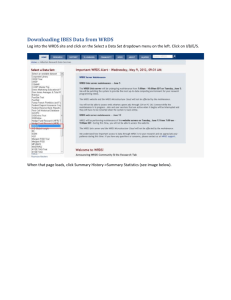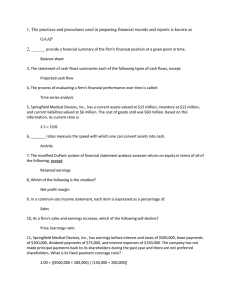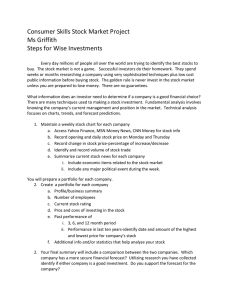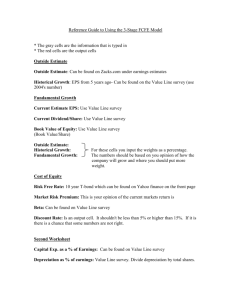Overview of IBES on WRDS: Research and Data Issues WRDS E-Learning Session
advertisement
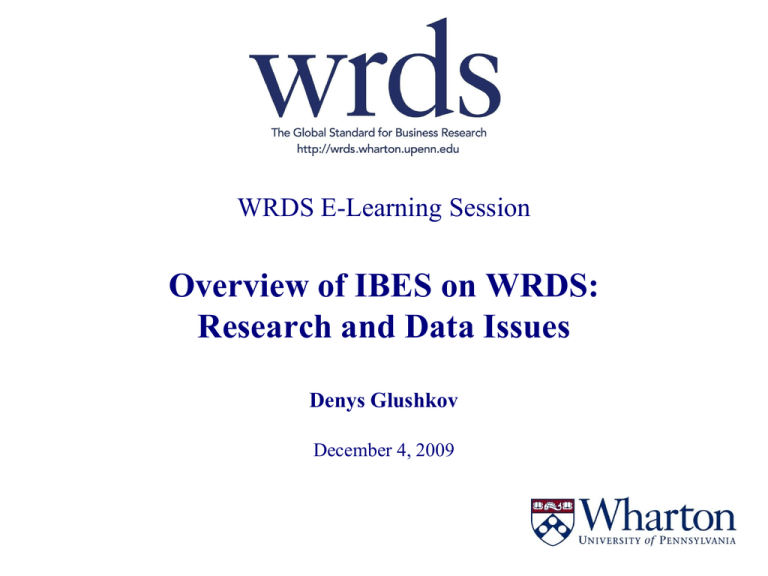
WRDS E-Learning Session Overview of IBES on WRDS: Research and Data Issues Denys Glushkov December 4, 2009 Webex Session Guidelines Welcome to WRDS E-Learning. Please use the following Webex guidelines: •Last 5 minutes of the presentation will be open to questions. No questions will be taken during the presentation •Audio problems? Disconnect and call in using one of the toll free numbers listed in the reminder email. Agenda Brief overview of IBES database: structure and coverage New Content and Variables Issues in empirical research using IBES Conclusions IBES Overview Thomson Reuters I/B/E/S provides detailed and consensus estimates featuring up to 26 forecast measures for more than 70,000 companies in more than 90 countries worldwide. Covered securities include some ETFs and stock indices, though their coverage is not consistent Measures include GAAP and pro-forma EPS, revenue/sales, net income, pre-tax profit and operating profit, as well as price targets and analyst recommendations As of Oct 2009, IBES covers over 70,000 companies 34.3% are US (24,310 firms) 65.7% are International (46,515 firms) including 6.8% (4,811) Canadian companies More than 2,700 firms contribute to IBES, from the largest global houses to regional and local brokers, with US data back to 1976 and international data back to 1987 IBES Company Level Footnotes Price Target Detail Summary Secondary Revision Momentum Summary Stats (2nd Mean) Restated Actuals ESTIMATES Adjusted Recently added RECOMMENDATIONS Unadjusted Detail Detail Summary Summary Detail Summary New Data in IBES Price Targets (Detail and Summary) Price target is the projected price level forecasted by the analyst within a specific time horizon. Thomson summary-level mean data is only calculated for targets with 12-month time horizons. Historical data is available as far back as March 1999. Covered securities include some ETFs, but do not appear to have stock indices Horizon 12 6 9 18 3 24 36 Other % of data 92.33% 6.38% 0.50% 0.39% 0.24% 0.08% 0.05% 0.03% Restated Actuals Restated Actuals presents restated data for the measures and periods provided by the company. The file can accommodate multiple restatements over the years, as applicable for the company. 70% US and 30% non-US. New Data in IBES (Cont.) Company Footnotes Footnotes are attached to estimates to alert clients as well as Thomson Financial Market Specialists of special actions or situations affecting estimates. There are three distinct types of footnotes that can be entered: Estimate, Company, and Instrument FOOTNOTE TEXT % OF OBS ESTIMATES BASED ON IFRS 32.49 ESTIMATES REFLECT ADOPTION OF FAS123(R) 30.32 EARNINGS ON A FULLY ADJUSTED BASIS 16.42 ESTIMATES DO NOT REFLECT ADOPTION OF FAS123(R) 15.16 EARNINGS ON A FULLY REPORTED BASIS 4.83 ESTIMATES REFLECTS FASB APB 14-1 0.44 ESTIMATES DO NOT REFLECT FASB APB 14-1 0.34 Other 0.01 New Data in IBES (Cont.) Secondary Revision Momentum Tracks revision momentum data less filtered estimates. The total number of estimates count, however, includes all estimates filtered and unfiltered. Dates back to May 2005 Summary Stats – 2nd mean (adjusted and unadjusted) In 2005, the European Union passed a regulation that requires listed European companies to comply with International Financial Reporting Standards (IFRS) for their consolidated financial statements. Summary Statistics (2nd Mean) provides the minority mean for a security both before and during IFRS compliance. When Pre-IFRS data is in the minority, the 2nd mean will reflect an IFRS mean. When IFRS becomes the majority, the 2nd mean will reflect non-IFRS estimates. Dates back to May 2005 “Normalized” vs. “Regular” IBES data As a result of currency fluctuations over time, starting with the April 2009 vintage, TR introduced Normalized historical files that include summary and detail data with normalized company default currencies In the normalized files, all estimates and actuals will be supplied in the default currency as of the latest tape cutoff date Illustrative example Thomson Reuters started coverage of company ABC in January 2001. The company was covered in USD. In March 2008, the majority of analyst covering company ABC started providing estimates in EUR. Therefore, TR changed the default currency to EUR. In the Detail and Summary Files prior to March 2008 all estimates and actuals will be displayed in USD. Starting with the March 2008 vintage, ALL previously supplied estimates in USD, will be displayed in EUR by converting values using the latest company default currency by using the closing exchange rate that coincides with the date prior to the announced date of the estimate Normalized files will not be available for the following measures as these are not affected by currency: Gross Margin (GRM), Recommendations, ROA and ROE Empirical Issues in IBES Rounding errors in IBES Adjusted Split Treatment in IBES Unadjusted Relationship between Summary and Detail History Best practices in Linking Comparison with First Call Working effectively with International part of IBES Other IBES announcements dates Activation (ACTDATS) vs Announcement (ANNDATS) date “Rewriting history” and vintage changes Discrepancies between EPS actuals in IBES and Compustat Note on Review date (REVDATS) in IBES Rounding errors in IBES Adjusted Data Traditionally, IBES provided forecast data on an adjusted basis, rounded to 2 decimal places on the Summary files and to 4 decimals on the Detail files. Adjustment and the corresponding rounding in IBES carries over the entire time-series for a given security Year 1 Company A Earnings 0.99 Forecast 1.00 Forecast error -0.01 Company B Earnings 1.01 Forecast 1.00 Forecast error 0.01 After a 4-for-1 Stock Split in Year 2 * 0.25 0.25 0.00 0.25 0.25 0.00 *From "The Implications of Using Stock-Split Adjusted IBES Data in Empirical Research" by Payne and Thomas (2003) Rounding issue is more severe in cases when Summary files are used IBES suggests a zero forecast error since the researcher can’t “unadjust” the data Rounding errors in IBES Adjusted (cont.) The adjustment issue becomes more pronounced as the split factor increases: After a 64for-1 Stock Year 1 Split in Year N * Company A Earnings 0.33 0.01 Forecast 0.64 0.01 Forecast error -0.31 0.00 Company B Earnings Forecast Forecast error 0.95 0.64 0.31 0.01 0.01 0.00 *From "The Implications of Using Stock-Split Adjusted IBES Data in Empirical Research" by Payne and Thomas (2003) Quick check in CRSP suggests that since Jan 1975 till Sep 2009 there are 528 stocks which experienced more than 16-for-1 splits, 215 stocks with more than 32-for-1 splits and 66 stocks with 64-for-1 splits. IBES Rounding errors: impact Payne and Thomas (2003) find that research conclusions are more likely to be affected by the rounding procedure in samples that have stock splits e.g., larger firms, higher M/B, better performers, etc AND Where the research question focuses on zero forecast error amounts assessing the percentage of zero forecast errors over time relating firm characteristics to the probability of zero forecast errors over time calculating the market’s reaction to zero forecast error inferring earnings management based on the distribution of earnings, earnings changes and forecast errors around zero What is a researcher to do? It is useful to know the actual historical amounts that are NOT adjusted for subsequent stock splits – IBES Unadjusted Data - and create their own split-adjusted data without rounding to the nearest penny If unadjusted data can not be obtained, an alternative is to recalculate IBES consensus statistics using the detail IBES adjusted data (which has rounding to 4 decimals) IBES Unadjusted Data I Unadjusted data consists of Detail history – Estimates, Actuals, Excluded and Summary Stats. As of Oct 2009, contains 10 measures (BPS, CPS, EPS and GPS among others). Previously, only EPS. Merging Unadjusted Actuals with Detail History is problematic If a split occurs between analyst’s Estimate date and the associated Report Date, the estimates and actual values may be based on different number of shares outstanding. E.g. Amazon split 2-for-1 on Jun 2, 98 and 3-for-1 on Jan 5, 1999. IBES TICKER ANNDATS ACTDATS ESTIMATOR ANALYS ACTUAL ANNDATS_ACT FPEDATS 42186 1830 32051 FORECAST VALUE -2.5 -2.1 -3.06 AMZN AMZN AMZN 20-May-98 26-May-98 28-May-98 20-May-98 26-May-98 28-May-98 86 192 229 -0.517 -0.517 -0.517 26-Jan-99 26-Jan-99 26-Jan-99 31-Dec-98 31-Dec-98 31-Dec-98 AMZN AMZN AMZN AMZN 4-Jun-98 4-Jun-98 8-Jun-98 8-Jun-98 4-Jun-98 4-Jun-98 8-Jun-98 8-Jun-98 229 86 125 191 32051 42186 2968 45029 -1.12 -1.17 -1.09 -1.21 -0.517 -0.517 -0.517 -0.517 26-Jan-99 26-Jan-99 26-Jan-99 26-Jan-99 31-Dec-98 31-Dec-98 31-Dec-98 31-Dec-98 …………………………………………………………………………………………………………………………………………………………………………………. 5-Jan-99 5-Jan-99 241 259 -0.67 -0.517 26-Jan-99 31-Dec-98 AMZN 5-Jan-99 5-Jan-99 100 30593 -0.54 -0.517 26-Jan-99 31-Dec-98 AMZN 5-Jan-99 5-Jan-99 229 32051 -0.56 -0.517 26-Jan-99 31-Dec-98 AMZN 14-Jan-99 14-Jan-99 899 53564 -0.54 -0.517 26-Jan-99 31-Dec-98 AMZN IBES Unadjusted Data II Potential solutions – IBES Method Based on adjusting actual values using IBES adjustment factor valid as of the report date and then unadjusting this adjusted actual using IBES adjustment factor valid as of the estimate date The problem is that IBES effective split date is NOT necessarily the true date of the stock split. Instead, this is the date when the split became “effective” within the IBES database. IBES “Split” Dates are Jun 18, 1998 and Jan 14, 1999. IBES TICKER AMZN AMZN AMZN ANNDATS ACTDATS ESTIMATOR ANALYS 20-May-98 26-May-98 28-May-98 20-May-98 26-May-98 28-May-98 86 192 229 42186 1830 32051 FORECAST VALUE -2.5 -2.1 -3.06 ACTUAL ANNDATS_ACT FPEDATS -3.102 -3.102 -3.102 26-Jan-99 26-Jan-99 26-Jan-99 31-Dec-98 31-Dec-98 31-Dec-98 AMZN 04-Jun-98 04-Jun-98 86 42186 -1.17 -3.102 26-Jan-99 31-Dec-98 AMZN 04-Jun-98 04-Jun-98 229 32051 -1.12 -3.102 26-Jan-99 31-Dec-98 AMZN 08-Jun-98 08-Jun-98 191 45029 -1.21 -3.102 26-Jan-99 31-Dec-98 ……………………………………………………………………………………………………………………………………………………………………………………………………….. AMZN 05-Jan-99 05-Jan-99 241 259 -0.67 -1.551 26-Jan-99 31-Dec-98 AMZN 05-Jan-99 05-Jan-99 100 30593 -0.54 -1.551 26-Jan-99 31-Dec-98 AMZN 05-Jan-99 05-Jan-99 229 32051 -0.56 -1.551 26-Jan-99 31-Dec-98 AMZN 14-Jan-99 14-Jan-99 899 53564 -0.54 -0.517 26-Jan-99 31-Dec-98 IBES Unadjusted Data III The same technique is more effective when used with IBES Unadjusted Summary IBES Effective Split date is linked to Summary file’s statistical period date, and both are mid-month dates Although tests show that results of the merge are significantly better, it is still possible to find exceptions IBES TICKER MSFT MSFT MSFT MSFT MSFT MSFT FPEDATS 31-Dec-89 31-Dec-89 31-Mar-90 31-Mar-90 30-Jun-90 30-Jun-90 STATPERS 14-Dec-89 18-Jan-90 15-Feb-90 15-Mar-90 19-Apr-90 17-May-90 ANNDATS_ACT 18-Jan-90 18-Jan-90 17-Apr-90 17-Apr-90 25-Jul-90 25-Jul-90 MEAN 1.00 1.01 1.16 1.16 0.59 0.62 ACTUAL 1.26 1.26 0.62 0.62 0.65 0.65 Microsoft split 2-for-1 on Apr 12, 1990 and they reported earnings on Apr 17, 1990, whereas IBES effective split date was April 19, 1990 So the problem occurs in Summary file whenever Split Date<Report Date<IBES Effective Split date Solutions to split treatment problem Alternative Solutions: Method 2: To get the correct split factor, one can merge the unadjusted data with the adjusted data and then back out the split factor. However, discrepancies may still occur due to the rounding effects in IBES Adjusted Data Method 3: Perhaps, the most accurate (albeit, time-consuming) way of joining Unadjusted Detail History with Unadjusted Actuals is to use CRSP cumulative adjustment factor. This involves using the sample code developed by WRDS which creates a linking table for IBES and CRSP “A Note on IBES Unadjusted Data” on the IBES Documentation page Post-Earnings Announcement Drift research application (see Research Applications link in Support Tab of WRDS website) Recreating Summary from Detail IBES includes only effective estimates while calculating the summary stats from detail, but provides no clear definition of what is considered an effective estimate Potential algorithm: Each forecast in Detail file that is included in the sample used to calculate NUMEST must: a. b. c. d. pertain to the same firm, measure and forecast period be issued prior to the Summary record’s statistical period date not be voided by IBES with an “Excluded” or “Stopped Coverage” flag be the latest estimate issued by that particular brokerage once conditions (a)(c) above are satisfied Analysis indicates that IBES polls brokerages, “lumping” together forecasts of different analysts, so that a forecast made by any one of them is discarded should any colleague issue one thereafter Further details in “Recreating Summary from Detail” document on IBES Documentation page Linking Detail and Recommendations History Matching should be performed by the analyst codes in the two files, ANALYS and AMASKCD. The analyst codes are the same in both files, but the broker codes are not (i.e., a given broker may have different codes in the two files). For each Detail History EPS estimate, match all unique recommendations that existed during the period that the estimate was still valid. That is, If a given analyst estimate was in effect between ANNDATS and REVDATS, each unique recommendation that existed for at least one day within that time period will generate a new record in the merged file The first date of the recommendation must come on or before the last date of the estimate, and the last date of the recommendation must come on or after the first date of the estimate. Linking Detail and Recommendations History Timeline: ESTDATS RECDATS EST.REVDATS REC.RREVDATS OR RECDATS ESTDATS REC.RREVDATS EST.REVDATS PROC SQL; CREATE TABLE Final AS SELECT d.*, r.emaskcd , r.anndats as recdats, r.revdats as rrevdats, r.estimid, r.etext FROM detsamp AS d LEFT JOIN recsamp AS r ON (d.ticker = r.ticker and d.analys = r.amaskcd) AND (r.anndats <= d.revdats and r.revdats >= d.anndats) QUIT; Linking IBES with other databases WRDS developed a script to build a linking table between IBES Ticker and CRSP Permno (/wrds/ibes/samples/iclink.sas) First Call vs IBES Measures, variables, time series and populations of broker/analysts differ FC data starts in 1980 and covers 5 measures; IBES dates back to 1976 and covers 26 measures FC features 451 brokers, whereas more than 2,700 contribute to IBES Company coverage: 15,714 in FC vs. near 70,000 in IBES Valuable: First Call contains company issued guidelines Linking both databases is challenging IBES Cusip is historical, FC Cusip is the header (most current) Broker IDs and Codes are different for both Estimates and Recommendations E.g., AG Edwards has Broker ID 244 in FC Estimates and Broker Code 000094 in IBES Detail E.g., AG Edwards has Broker Code “AG” in FC Recommendations and Broker ID “EDWARDS” in IBES Recommendations IBES International CUSIP in IBES could represent either a CUSIP or SEDOL depending on whether the company is foreign or not Country can be identified by the first two digits of SEDOL or country ID in IDSUM USFIRM dummy variable refers to the firm being followed, not the broker or analyst. Canadian companies have USFIRM=0 and no “@” in IBES ticker According to IBES, “international companies (i.e. non-US companies) are covered by international (non-US) analysts and US companies are covered by US analysts If the broker or the analyst which covers an international firm is a US company, the analyst is located in a foreign office of that broker IBES International: Dealing with Currencies Major Currency Variables: CURR, REPORT_CURR and CURR_ACT CURR in the Detail History contains the currency in which the estimate was provided to IBES (the “estimate level”) by an analyst CURR_ACT in Actuals set always reflects company’s reporting currency REPORT_CURR in the Detail History (merged from Report Currency File) shows the default currency in which all estimates are entered for a given firm (the “company level”). The currency in which majority of analysts provide their estimates to IBES Useful Rule of Thumb for Conversion REPORT_CURR=CURR_ACT - No currency conversion is needed REPORT_CURR<>CURR_ACT - Apply Exchange Rate as of Activation Date Note that CURRFL variable is NOT a currency variable and its values appear to have been mixed with CCOPCF (Canadian Currency or Parent/Consolidated Flag) variable. IBES promised to fix this issue. Unreliable for use Issues with IBES Announcement Dates Acker and Duck (2009) compared earnings announcement dates in IBES and Worldscope as well as analysts’ end-of-fiscal year earnings forecasts of UK companies between Jan 1 1999 and 31 Dec 2006: Year-end earnings announcement dates are frequently misreported in IBES: Out of 1,874 hand-collected EADs, authors found dates 24% to be incorrect, 97% of which were later than the true date 25% of these discrepancies – 1-2 days, other 25% - 3-10 days, other 40% - 11-50 days Discrepancies between IBES (mislabeled) and Worldscope (correct) EADs When IBES’ EAD is later than the true report date, it is possible for the forecasts also to be dated after the true report date. Less of a problem as IBES reports both announcement and activation dates for forecasts Among other problems, the potential impact includes In event studies, important parameter estimates to be biased towards zero (event windows not likely to solve, as 72% of incorrect dates are out by more than 3 days) True PEAD may wrongly be ascribed to pre-announcement information leakage Date and Time variables in IBES New version of IBES is time-stamped ANNDATS, ANNTIMS: Date and Time when the estimate/ recommendation was released by an analyst ACTDATS, ACTTIMS: Date and Time when the estimate/ recommendation was entered into the database Recommendations (US firms only) ACTDATSANNDATS 0 1 3 2 4 5 6 7 8 9 11 10 13 12 14 15 other Frequency Percent 965,338 175,252 34,159 31,646 16,613 10,014 9,180 7,394 4,551 2,441 2,272 2,056 1,867 1,677 1,637 1,440 17,046 1,284,583 75.15 13.64 2.66 2.46 1.29 0.78 0.71 0.58 0.35 0.19 0.18 0.16 0.15 0.13 0.13 0.11 1.33 100 Estimates (EPS for US firms only) ACTDATSANNDATS 0 1 3 2 4 5 6 7 8 9 10 11 13 12 14 -3 other Frequency Percent 10,472,123 1,845,572 387,725 276,233 224,466 142,773 104,671 80,548 49,607 24,677 22,879 19,775 16,618 16,320 12,905 12,841 134,842 13,844,575 75.64 13.33 2.8 2 1.62 1.03 0.76 0.58 0.36 0.18 0.17 0.14 0.12 0.12 0.09 0.09 0.97 100 Rewriting History Ljungqvist, Malloy and Marston (JF, 2009) document widespread changes to the historical IBES analyst stock recommendations: Across seven IBES downloads, obtained between 2000 and 2007, authors find between 1.6% and 21.7% of matched observations are different from one download to the next Four types of changes: alterations, deletions, additions and anonymizations. Non-trivial implications on research that analyzes Profitability of trading signals and consensus recommendation changes. E.g., 3-day event returns to upgrades (downgrades) average 3.02% (-4.72%) on the 2007 tape, but only 2.30% (-3.79%) on the 2004 tape. Persistence in individual analyst performance (analysts’ track records). The 2001 thru 2005 IBES downloads produce inflated estimates of persistence compared to the 2007 Thomson-Reuters regard the 2007 tape as purged of the data errors LMM identified, except that it continues to include alterations made as a result of broker requests for retrospective changes to their buy/hold/sell recommendation scales IBES/FC Vintage Changes Frequent incidents of removal of history for different brokers According to TR, in July-Aug 2009 vintage history for 3 brokers (Lehman, RBC Capital Markets and Shinyoung Securities) was completely removed due to the Disentitlement of contributors According to TR, Banc of America has officially disentitled WRDS from viewing all of their historical forecasts on Thomson (IBES and FC) feeds. Difference in IBES and Compustat EPS actuals Livnat and Mendenhall (JAR, Mar 2006) provide a nice discussion on why differences may arise: Compustat follows a policy of changing firms’ recorded quarterly earnings figures to reflect restated values. IBES includes the originally reported earnings. Now restated actuals are available in IBES Compustat’s earnings reflect GAAP, while most analyst-tracking services report “street” measures of earnings. That is, IBES earnings exclude various expenses required by GAAP. Some expenses omitted from street earnings can be found in Compustat’s variable “Special Items” and can be backed out. IBES observes the market reaction to the earnings announcement prior to choosing exactly which earnings components to include in street earnings. This leads to a potential ex post selection bias. IBES uses weighted average of the shares outstanding in EPS calculations, but does not report this average Also a great overview of the issue is in “GAAP vs. The Street: an Empirical Assessment of Two Alternative Definitions of Earnings” by Bradshaw and Sloan (JAR, 2002) Other issues in IBES There are estimates which are dated “after” the announcement date. We have no explanation other than the entry is in error. % of such observations in the latest vintage (Oct 2009) is quite small (0.13% or 172,640 records) IBES defines REVDATS as ”most recent date that an estimate was confirmed as accurate”. Note that Announcement of earnings will increment the FPI variable by 1 in all IBES records for which review date (REVDATS)> report date (ANNDATS_ACT) If at the time of the next review date the analyst at the same brokerage changes her forecast for the same (TICKER, ANNDATS, FPEDATS, FPI, MEASURE, USFIRM) combination, IBES will add a new observation. If the forecast remains unchanged, IBES will not add new observations, but will adjust the review date accordingly (REVDATS) ESTFLAG and ACTUALF variables in Summary History and Actuals – allow users to determine whether the estimate/actual is provided on a parent or consolidated basis Conclusions Working with IBES requires good understanding of some issues: Understand the difference between ANNDATS and ACTDATS. Pick the one which more closely fits your research question Be aware of rounding issues in Adjusted Data which may lead to wrong estimates of earnings surprises Make sure to link Unadjusted Data and Actuals so that estimate and actual are on the same per-share basis (see more on IBES Documentation page) Replicating Summary from Detail appears to work better when the latest estimate for a given broker (not analyst) is included Make sure to understand the difference between various Currency Variables, Flags, Indicators and Codes in IBES International data Understand the difference between GAAP earnings (Compustat) and Street earnings (IBES, First Call) Due to unavoidable changes and revisions IBES makes from one vintage to another, WRDS recommends working with a saved vintage of IBES References 1. 2. 3. 4. 5. 6. 7. Acker, D., and Duck, N., (2009). “On the Reliability of IBES Earnings Announcement Dates and Forecasts”, Working Paper, University of Bristol Bradshaw, M. and Sloan, R. (2002). ”GAAP vs. The Street: an Empirical Assessment of Two Alternative Definitions of Earnings”, Journal of Accounting Research, Vol. 40 No. 1, pp. 41-66 Glushkov, D. and Robinson D. (2006). “A Note on IBES Unadjusted Data”, WRDS Documentation on IBES, available at http://wrds.wharton.upenn.edu/ds/ibes/lib/IBES_Unadjusted_Data.pdf Ljungqvist A., Malloy, C. and Marston F. (2009). “Rewriting History”, Journal of Finance, forthcoming, available at http://www.afajof.org/afa/forthcoming/4287.pdf Livnat, J. and Mendenhall, R. (2006). “Comparing the Post-Earnings Announcement Drift for Surprises Calculated from Analyst and Time Series Forecasts”, Journal of Accounting Research, Vol. 44 No. 1. Payne, J. and Thomas B. (2003). “The Implications of Using Stock-Split Adjusted I/B/E/S Data in Empirical Research”, Accounting Review, 78(4), 1049-1067 Shvorob, D. and Vora, P. (2006). “Recreating IBES Summary based on Detail History File”, WRDS Documentation on IBES, available at http://wrds.wharton.upenn.edu/ds/ibes/lib/IBES_Summary_from_Detail.pdf
